Speed of Glacier Retreat Worldwide Reaches Record Levels
Scientists say tens of thousands of glaciers are melting faster than ever -- and many will continue to do so even if climate change can be stabilized.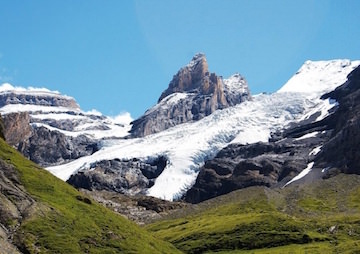
By Alex Kirby, Climate News Network
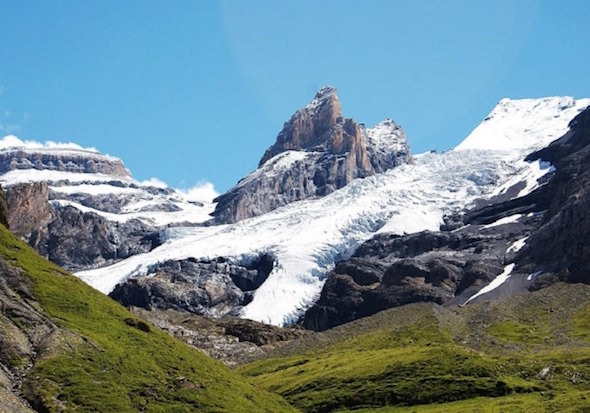
Many glaciers in the European Alps could lose about 50 percent of their present surface area. (TonnyB via Wikimedia Commons)
This Creative Commons-licensed piece first appeared at Climate News Network.
LONDON — The world’s glaciers are melting fast — probably faster than at any time in recorded history, according to new research.
Measurements show several hundred glaciers are losing between half and one metre of thickness every year — at least twice the average loss for the 20th century — and remote monitoring shows this rate of melting is far more widespread.
The World Glacier Monitoring Service (WGMS), based at the University of Zurich, Switzerland, has compiled worldwide data on glacier changes for more than 120 years.
Drawing on reports from its observers in more than 30 countries, it has published in the Journal of Glaciology a comprehensive analysis of global glacier changes.
Pictorial sources
The study compares observations of the first decade of this century with all available earlier data from field, airborne and satellite observations, and with reconstructions from pictorial and written sources.
Dr Michael Zemp, director of WGMS and lead author of the study, says the current annual loss of 0.5-1 metre of ice thickness observed on “a few hundred glaciers” through direct measurement is two to three times more than the average for the last century.
 Evidence of how much the Rhone glacier in the Swiss Alps receded between 2007, above, and 2014. (Images by Simon Oberli)
Evidence of how much the Rhone glacier in the Swiss Alps receded between 2007, above, and 2014. (Images by Simon Oberli)
“However, these results are qualitatively confirmed from field and satellite-based observations for tens of thousands of glaciers around the world,” he adds.
The WGMS compiles the results of worldwide glacier observations in annual calls-for-data. The current database contains more than 5,000 measurements of glacier volume and mass changes since 1850, and more than 42,000 front variations from observations and reconstructions stretching back to the 16th century.
Intense ice loss of the last two decades has resulted in a strong imbalance of glaciers
in many regions of the world
Glaciers provide drinking water for millions of people, as well as irrigating crops and providing hydropower. When they melt, they also make a measurable contribution to sea level rise.
The researchers say the current rate of glacier melt is without precedent at the global scale — at least for the time period observed, and probably also for recorded history, as reconstructions from written and illustrated documents attest.
Long-term retreat
The study also shows that the long-term retreat of glacier tongues is a global phenomenon. Intermittent re-advance periods at regional and decadal scales are normally restricted to a smaller sample of glaciers and have not come close to achieving the Little Ice Age maximum positions reached between the 16th and 19th centuries.
Glacier tongues in Norway, for example, have retreated by some kilometres from their maximum extents in the 19th century. The intermittent re-advances of the 1990s were restricted to glaciers in coastal areas, and to a few hundred metres.
The study shows that the intense ice loss of the last two decades has resulted in what it calls “a strong imbalance of glaciers in many regions of the world”. And Dr Zemp warns: “These glaciers will suffer further ice loss, even if climate remains stable.”
He told Climate News Network: “Due to the strong ice loss over the past few decades, many glaciers are too big under current climatic conditions. They simply have not had enough time to react to the climatic changes of the past.
“So they will have to retreat further until they are in balance with climatic conditions again. In the European Alps, many glaciers would lose about 50% of their present surface area without further climate change.”
Your support is crucial…With an uncertain future and a new administration casting doubt on press freedoms, the danger is clear: The truth is at risk.
Now is the time to give. Your tax-deductible support allows us to dig deeper, delivering fearless investigative reporting and analysis that exposes what’s really happening — without compromise.
Stand with our courageous journalists. Donate today to protect a free press, uphold democracy and unearth untold stories.


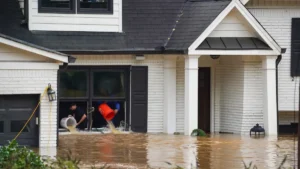

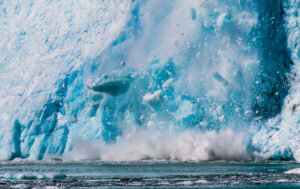
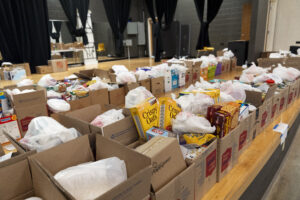

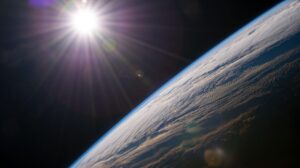


You need to be a supporter to comment.
There are currently no responses to this article.
Be the first to respond.